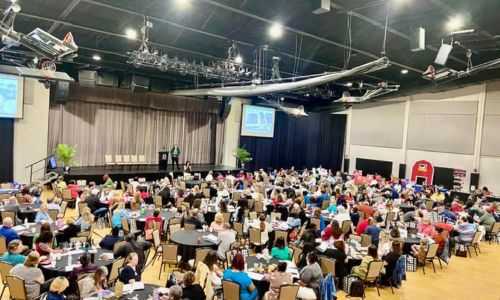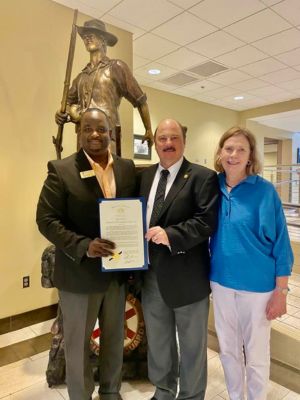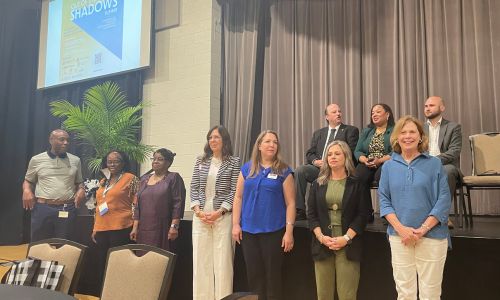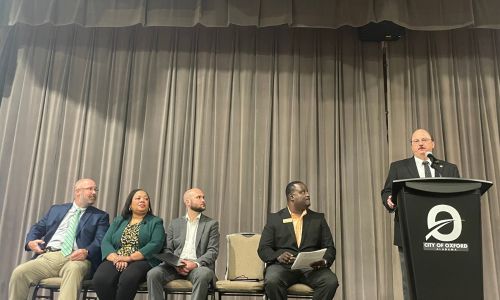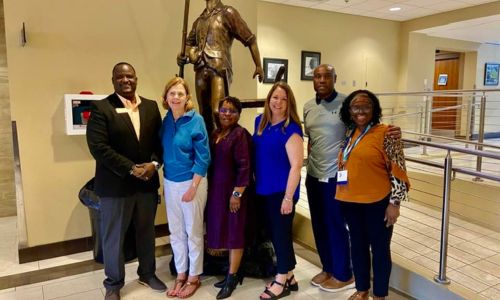Oxford, AL – This past Friday, the city of Oxford was the site of an enlightening and empowering event aimed at raising awareness about mental health issues. The Out of the Shadows Summit, hosted at the Oxford Civics Center, brought together a diverse array of professionals and community members to discuss, learn, and advocate for improved mental health resources and support.
The summit offered attendees a unique opportunity to gain insights from a remarkable lineup of speakers, each bringing their expertise and perspective to the forefront. Among the highlights of the event was the keynote address by Dr. Saundra Dalton-Smith, a renowned physician, researcher, author, and speaker. Dr. Dalton-Smith’s talk on “The Restorative Edge” set the tone for the day, inspiring attendees with her insights into mental wellness and restoration.
In addition to Dr. Dalton-Smith’s keynote, the summit featured presentations from local professionals covering a wide range of topics related to mental health. From discussions on the impact of frequent cannabis use on mental health to sessions on energy management for caregivers and leveraging social media to promote mental health awareness, the summit provided valuable information and resources to attendees.
Sheriff Matthew Wade, speaking to the Calhoun Journal, emphasized the urgency of addressing mental health issues in Alabama:
“Mental illness is something that every jail in the state of Alabama deals with. Resources are not there to properly take care of people in the state of Alabama for this. Jails become a de facto mental health hospital, there’s just not enough resources for mental health officials to help, they just don’t have enough. These people end up in a county jail, and that’s not right for them or us. Unlike other diseases, such as cancer, it doesn’t change their behavior. Mental illness changes people’s behavior and will make them go out untreated, they’ll go out and do mass shootings or shoot up schools or shoot up public areas such as malls, or kill their families. It’s very important that the state of Alabama recognizes that we all have a vested interest in people and treating people with mental illness because if left untreated, bad things can happen, not just to them, but to innocent people, out in the community. That’s why the state of Alabama needs to invest more for mental health. Senator Kelly and I have had several discussions about that and he has been very supportive and trying to find ways to correct these deficiencies and find funding and find ways to help these people so we can reduce mental illness in the state of Alabama. Most people that are homeless, are mentally ill, there are resources out there that will help them find a home, get them help, groceries, pay their house, they just don’t have the faculties to do all of that and so they end up homeless because of their illness. Just like cancer, nobody wants cancer. Nobody can keep themselves from getting mental illnesses the same way. Nobody asked for it. Nobody wants it. It’s not shameful.”
Senator Keith Kelly echoed Sheriff Wade’s sentiments, emphasizing the importance of community support and advocacy in addressing mental health issues:
“This event really does hit home for me, because one of the things I did a lot of years ago, before I was ever elected was led an effort to get help for mental health issues, and securing against mental health officer for each county. I had to figure out how to get it funded and again, I was just a person on the street with a burden on my heart. We have to come together, I got some folks and it passed in the Senate. to sponsor it for us, I figured out how we, we could fund it. Because the big problem you had was a lot of times someone that had mental health issues, were getting arrested and they were being put in jail and a regular jail, and they were getting assaulted in so many ways. This allowed for a buffer time for them to be taken care of before. Also I’ve also coached for about 17 years football, baseball. So a lot of the young men I’ve coached, have had issues, either military or otherwise and so there’s a lot of connections with the discipline, assisted with him when I was in high school as well.”
During his speech, Senator Kelley presented Fred Smith, Vice President of the Community Partnerships, Community Foundation of Northeast Alabama, with a resolution from The Senate of Alabama commending the Community Foundation of Northeast Alabama for supporting the Out of the Shadows Mental Health Summit. The resolution recognized the foundation’s commitment to advancing mental health initiatives and providing essential resources to communities across the region.
The summit also featured additional speakers and topics, including:
– Dr. Linda White & Teresa Price: “A Family Practice Perspective on Mental Illness and Substance Use Disorders”
– Dr. Angela Walker: “Begone Tight Lips: Conversations About Miscarriages”
– Mamta Mishra: “Energy Management for Caregivers”
– Danielle Hall: “Sound Therapy for Self Care”
– Tricia Nelson, Haley Helms Jennings, and Edith K Couch: “People, Pets, and Therapy”
– Dr. Mindi Amberson: “Unplugging the Mind: Navigating the Intersection of Technology Dependence and Mental Health Across Lifespan”
– Rev. John G. McDonald: “¿Me entendiste? The Mental Health Challenges Faced by Non-English Speakers in Northeast Alabama”
– Dorothy McDermott: “Get Well: A Fresh Perspective on Mental Wellness”
– Tiffany DeBoer Owens: “Leveraging Social Media to Promote Your Agency Message”
– Jessica Mayberry: “Quieting the Mind and Healing from Trauma Through Yoga”
– Robert Luna: “Rob’s Walk Across America”
– Gloria Johnson & Vanna Sanderson: “What the Heck has Happened Here? Caregiver Responsibilities, Challenges, and Role Reversal”
– Carol Hudson, Vicki Shelley, and Sherry Brown: “Equine Assisted Activities to Engage, Enlighten, and Empower Those with Special Needs”
Overall, the Out of the Shadows Summit served as a powerful platform for raising awareness, fostering dialogue, and promoting positive change in the realm of mental health. By bringing together professionals, advocates, and community members, the event underscored the importance of collective action in addressing mental health challenges and supporting those affected by them.
As the summit concluded, attendees left with a renewed sense of purpose and determination to continue the conversation and drive progress in mental health advocacy. The event’s impact is expected to resonate long after its conclusion, as communities across Oxford and beyond work together to prioritize mental wellness and support those in need.
